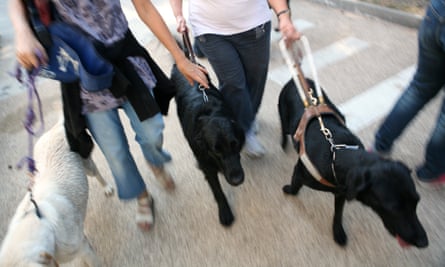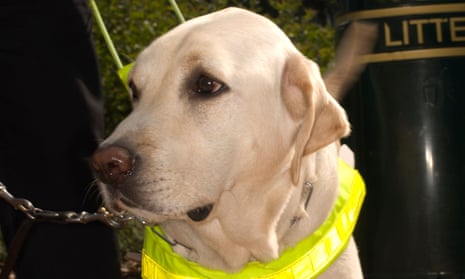It’s happened to me 30 times or more in 18 years of working with a guide dog – but no words can describe just how crushed and assaulted I felt this week when an Uber driver refused to carry me with my guide dog in Hertfordshire.
The law in England and Wales is completely clear. It is a criminal offence for the driver of any private hire or hackney carriage vehicle to refuse to carry a disabled passenger because they are accompanied by an assistance dog. It’s covered in the Equality Act 2010. Drivers with allergies can apply for an exemption on medical grounds. Similar provisions apply in Scotland, although prosecutions can only be made for licence breaches. It’s sad that such laws are even needed.
In my experience, the reason for refusals vary – mostly it’s down to a cultural misunderstanding about guide and assistance dogs – but in this case, I’ll never know precisely why the BMW driver, who is licensed by Wolverhampton city council, refused to accept my guide dog as he cancelled my job and drove off, leaving me miles from home and alone in the rain. I complained through the normal channels, but to date have never heard what, if any, action was taken.
Uber has done a great deal of work to address what has historically been a big problem with their partner drivers – working as it has with the charity Guide Dogs. I would on the whole like to praise them for the work they continue to do – but it’s unfortunate that Uber doesn’t have a telephone number to call. They might not regard a physical conversation to be very 21st century, but it would help me as a registered blind customer to be able to speak to someone when incidents happen.
I would also call upon Uber to change its so called “privacy policy” when it comes to informing passengers what action, if any, they have taken. I have heard of cases where the tech giant has refused to tell guide dog owners which authority their partner driver is licensed by. This means it is sometimes impossible for any licensing or criminal action to be taken. How can we be expected to trust that drivers are being dealt with appropriately? Why is it such a secret?
Uber argues that false allegations of all types are made – so in this, I agree that privacy is important in some cases – but it seems strange that it would be so secretive and less than transparent about criminal misconduct. Uber may have done some great work on this issue but if it wants to be taken seriously, it must do better.

Not everyone supports the disabled passenger in a situation like mine. Facebook pages are littered with people who argue that a publicly licensed cab driver should have the ability to decide who is allowed in their car. One erstwhile colleague said to me “who cares? Move on and order another one.” But another one is not always available. As a journalist who travels around the country, I experience refusals more than most – but I still can’t quell the upset each time it happens. I still never sleep the night after.
If only those who refuse guide and assistance dogs could put themselves in the place of someone with recent sight loss, just starting to travel independently with a new guide dog, trying to get their lives back on track. How might they feel if a driver left them at the side of the road due to prejudice that in any other form than disability discrimination would be dealt with by the police?
Instead, more than 300 councils who license cabs across the UK, and Transport for London, are responsible for enforcement – and that means more than 300 entirely disjointed policies. We may have one national law, but this ancient and archaic model means there is a postcode lottery of inequality.
In 2015, 337 licensing authorities responded to a freedom of information request as part of an investigation I ran into this issue. Over 18 months, 162 allegations of refusals to carry a guide or assistance dog were made, but only 17 drivers were prosecuted. My research uncovered the fact that many councils simply don’t understand the law they are responsible for enforcing. Amber Valley, for instance, had a policy of issuing medical exemption certificates on religious grounds – and Middlesbrough was not aware that it is a criminal offence to refuse an assistance dog. Many councils, such as Liverpool city and Bradford, told me they had a policy not to prosecute drivers – instead, they consider non-criminal enforcement action. Other councils operate a warning system where drivers are otherwise unpunished.
Councils who do not prosecute argue that their job is to ensure compliance by any means. Some councils say it is not proportionate to prosecute a first-time offender. I don’t think those councils understand the true impact a refusal has. They don’t understand the apprehension I feel every time I book a cab. They don’t know what it’s like to pay out more than £300 for camera equipment to record encounters. And they simply cannot comprehend the deep hurt it causes every time a refusal happens.

While Liverpool city council was one of the larger councils to tell me that it never prosecutes, they have nevertheless been very proactive, becoming one of the first councils in the country to run mystery shopping tests. It was recently and rightly presented with an award by Guide Dogs for its proactivity – but it’s entirely wrong for any licensing authority to ride roughshod over the criminal law which has been hard won in parliament.
The reality is that many cases still go unreported. There are just over 5,000 working guide dog partnerships across the UK. Not everyone is lucky enough to be able to get an offender’s details to report them. In 2015, a survey by Guide Dogs found that 75% of all assistance dogs users – not just guide dogs – have experienced such a refusal at some point.
I’m not heartless or vindictive. I understand that the priority must be to educate. I would far rather that than enforce, and I’m grateful to Jamie Mackenzie from Watford council’s licensing department for inviting me to help train drivers in his area. But the impact of a refusal can be so crushing to someone’s independence that once may be enough to seriously affect a life. The impact on the victim is always profound.
This is something the courts should understand too. When we consider that only a tiny number of drivers are ever prosecuted, it is disappointing to see such variations around the country, with magistrates courts imposing fines of between £1,000 and £55. Why is one refusal more important or different to another?
More consistency is urgently needed, and we need to challenge the postcode lottery of enforcement and punishment.
